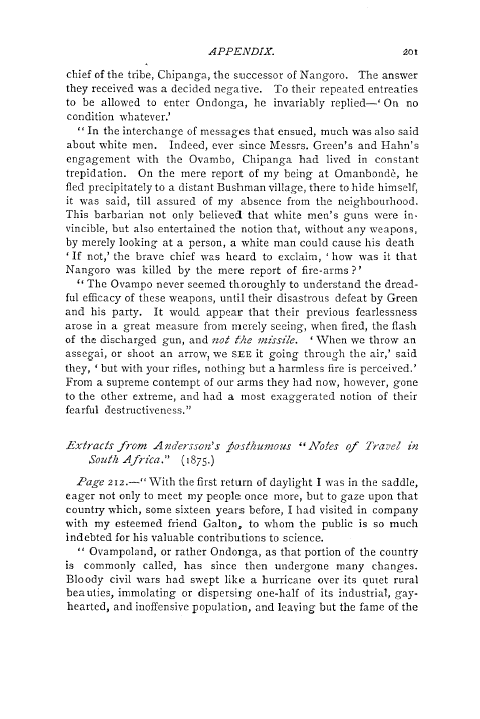APPENDIX. 201
chief of the tribe, Chipanga, the successor of Nangoro. The answer they received was a decided negative. To their repeated entreaties to be allowed to enter Ondonga, he invariably replied- On no condition whatever.'
In the interchange of messages that ensued, much was also said about white men. Indeed, ever since Messrs. Green's and Hahn's engagement with the Ovambo, Chipanga had lived in constant trepidation. On the mere report of my being at Omanbonde, he fled precipitately to a distant Bushman village, there to hide himself, it was said, till assured of my absence from the neighbourhood. This barbarian not only believed that white men's guns were in, vincible, but also entertained the notion that, without any weapons, by merely looking at a person, a white man could cause his death If not,' the brave chief was heard to exclaim, ' how was it that Nangoro was killed by the mere report of fire-arms ?'
" The Ovampo never seemed thoroughly to understand the dreadful efficacy of these weapons, until their disastrous defeat by Green and his party. It would appear that their previous fearlessness arose in a great measure from merely seeing, when fired, the flash of the discharged gun, and not the missile. ` When we throw an assegai, or shoot an arrow, we SEE it going through the air,' said they, ` but with your rifles, nothing but a harmless fire is perceived.' From a supreme contempt of our arms they had now, however, gone to the other extreme, and had a most exaggerated notion of their fearful destructiveness."
.Extracts from Andersson's 5osthumous "Notes of Travel in South Africa." (1875.)
Page 212.-" With the first return of daylight I was in the saddle, eager not only to meet my people once more, but to gaze upon that country which, some sixteen years before, I had visited in company with my esteemed friend Galton, to whom the public is so much indebted for his valuable contributions to science.
" Ovampoland, or rather Ondonga, as that portion of the country is commonly called, has since then undergone many changes. Bloody civil wars had swept like a hurricane over its quiet rural beauties, immolating or dispersing one-half of its industrial, gayhearted, and inoffensive population, and leaving but the fame of the

